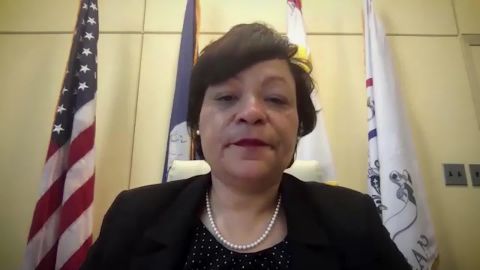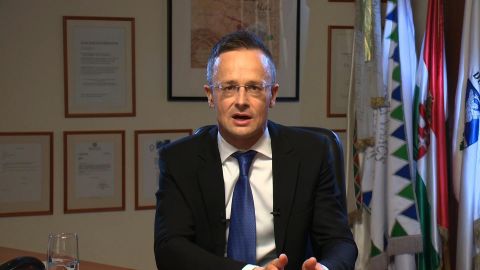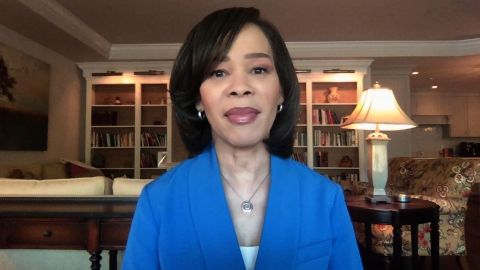Read Transcript EXPAND
CHRISTIANE AMANPOUR: Coronavirus has hit Louisiana hard and new data reveals that the virus is hitting African-Americans hardest, where the states Black community accounting for 70 percent of deaths, even though they only make up 33 percent of the population. The mayor of New Orleans, LaToya Cantrell, says this disparity is reflected nationwide, because of systemic problems like poverty traps and lack of resources. Meantime, critics say New Orleans should have locked down earlier. The mayor tells our Water Isaacson why Mardi Gras went ahead.
WALTER ISAACSON: Madam Mayor, thank you for joining us.
MAYOR LATOYA CANTRELL (D-NEW ORLEANS, LA): Thank you for having me.
ISAACSON: We’ve seen over the past few days now a decline in the amount of a hospitalization, a decline this the use of respirators. Have we reached the point where your stay-at-home measures seem to be flattening the curve?
CANTRELL: We have reached a point to where our stay-at-home efforts and mandates, they are working. We have to maintain the mandates, the stay-at-home orders. This is the time that we do not let up, that we get more aggressive, as it relates to the stay-at-home mandates. We do not want to regress. We want to continue to make progress. And so, we are not claiming victory at all. And we are just now starting to see the curve. So, we’re not in the situation where we’re flattening. We are approaching the curve and we are shifting and pivoting really into not only more care, but stopping people from dying. And that’s the focus. We want to stop the deaths from happening.
ISAACSON: You know, we in New Orleans are not very good at social distancing. And I’m here in the French quarter and I look outside and I see that you have police cars that are breaking up anybody who’s in the crowd walking around trying to go. How have you been trying to enforce this stay-at-home order?
CANTRELL: Well, the biggest level of enforcement is, one, having the presence of the law enforcement, but at the same time, pushing for personal responsibility. And we, as we look at the mobility data from cell phone usage, we know that 73 percent, you know, of our people, in terms of moving around, they’re not. So, they are adhering to the mandates. They’re taking it very seriously and we are, as well, as a city. Because we cannot allow people to move about, break the law and do nothing about it. So, when we act swiftly, it really sets the tone that not only do we mean business, but this crisis, it’s serious. People are dying and people are sick.
ISAACSON: When you have cell phone data, you have the cameras, the traffic cameras around the city, how do you balance the concerns people might have about privacy with the need to look at as much information as possible to see who’s moving around?
CANTRELL: Well, one, we’re not — all that we’re looking for and we’re not using our traffic cameras or, you know, to follow people. That’s not what we do. And as it relates to the cell phone data, it’s strictly around mobility. How you can see, and you don’t have — it’s not the individualized, it’s just really the traffic. And so, we’re not crossing the line with people’s personal information or data points, but we are using it to see if people are following the rules, and they are staying put and that’s a good thing.
ISAACSON: With the recent decline in the need for hospitalization in New Orleans and the reduction of the need for ventilators, do you think that’s going to change how we use the convention center in our emergency preparedness?
CANTRELL: Well, first of all, our people are still in the hospital. I don’t want to give sense that folks are not hospitalized. They are and they are still at record numbers. But what we’re seeing is that our people are, one, coming off of those ventilators sooner rather than later. The surge capacity at the convention center, our medical monitoring facility opened on yesterday. We opened up with fewer than 20 patients there. We are seeing that based on how well our health care workers are doing, you know, the best job ever within those hospitals, it does make us feel that we will not have to surge up to the capacity of 3,000. So, right now, it’s at 1,000. We believe that that will be sufficient. But, again, the convention center is for region one, and that’s multiple parishes that make up region one. So, we may find ourselves being a much greater service to our regional parishes than just Orleans.
ISAACSON: Our family homes are in the same neighborhood, right in the heart of New Orleans, called Broadmoor. And during Katrina, you worked with my father and others in trying to make sure we came back neighborhood by neighborhood. Reflect on that for a moment and how that’s helping you organize neighborhood recoveries as we come out of this.
CANTRELL: Well, one, it is engaging the people who are on the ground, meaning these neighborhood leaders. You know, they have a role to play. So, I have been engaging them in multiple ways. So, whether that is having consistent conference calls with them, calling them to task with helping with feeding, cleaning up even their communities, their areas, knowing their neighbors. You know, a disaster is not the time to start learning who people are. You should know that. And we have been trained to do this, particularly, you know, in the post-Katrina environment. So, reminding people that, you know, your neighbors are your first responders and you have to be organized. And so, I’ve organized government, I’ve organized community in many ways like I did post-Katrina. I have over 13 active committees that engages the business community, the hospitality and tourism. I mean, it just goes on and on. The deaf care community. Of course, neighborhoods, public schools. All of these different mechanisms. It helps, one, to give people accurate information, which is essential, and also, it keeps them not only informed, but it empowers them to be a part of the us and to get out of the way. Don’t hurt us.
ISAACSON: As we were preparing for Mardi Gras, you worked very closely with FEMA, the feds, the FBI, everybody else to make sure that security was great during Mardi Gras. Did anybody from homeland security or the federal government warn you about the pandemic and say you should do something differently?
CANTRELL: Oh, no, not at all. Well, there were no red flags given to the City of New Orleans through our unified command and leading up to Mardi Gras. We had increased our rating with the federal government (INAUDIBLE) rating for Mardi Gras, which we had never had before, which means additional courses that will flow through the federal government, as well as people on the ground. So, I had special agents on the ground in the community walking with the chief and our public safety team every parade.
ISAACSON: So, nobody ever recommended you should cancel Mardi Gras?
CANTRELL: Oh, no one recommended that we would cancel Mardi Gras. And even when I moved to cancel St. Patrick’s Day and Super Sunday, March 9th, you know, all hell broke loose with that as well, being ridiculed, you know, at the state level and all, but it was the right thing to do. And when I look at the forecast of data, not only did we do the right thing, we saved countless lives and we’ll continue to do that.
ISAACSON: What have you asked for from the federal government or the state government that you have not received? What are your priorities now?
CANTRELL: Well, the priorities have been definitely around the PPE, getting the protective equipment that our front-line workers, our employees, our first responders, that they desperately need, and consistently. That’s been a continued struggle, but we’re seeing things come in. Testing was an issue initially, but we’re testing more than any other city in the country. And we’re second to Iceland right now, which is a real reflection in the numbers, in the cases. But you have to — you have to have the data to know where you are and how you’re doing. So I’m happy about that. As it relates to the stimulus package, we were very aggressive on the front end of galvanizing our federal delegation, as well as our state delegation, for advocating for the needs of the city, which led to some infusion of stimulus dollars, even set-asides for Orleans, through HUD and the like. So things are moving. We just need to make sure that the city is at the table, as resources will flow from the federal government to the state, because the city will not receive directly because of our population. So, I want to make sure we’re in line to get our fair share. We are an economy, again, driven by hospitality. We have over 110,000 workers that are attached to that and more. The gig economy and the resources that they need, gap financing, to keep their family steady, is huge. We believe that we’re going to need to feed over 200,000 over the next couple of weeks daily. And so these continue to be some needs. But I’m hopeful, based on the response of our federal delegation, coming together, working across those bipart — you know, being across the lines, to deliver.
ISAACSON: Seventy percent of coronavirus cases in Louisiana are among African-Americans, even though African-Americans are only 33 percent of the population. Why is it affecting the black community more?
CANTRELL: Well, I think what this pandemic has exposed, particularly in the United States — and it’s not that we don’t know it, right? But it has absolutely exposed the fragility within our community, the black community, the working — within working families, the disparity gaps that existed that we knew were prevalent, not only in New Orleans, but the United States of America. But it brings it home in these instances. So it’s a public health disparity issue. And public health touches everything, from housing, to employment, to physical health, to wellness, the economics. It all matters. And so black folks, in regards to the disparity gaps that exist in this country, make up the majority that fall in that gap, and so our most vulnerable. So when you’re in a — when you’re faced with a crisis like we’re in, it’s your most vulnerable people within your population who suffer the most. So we will continue to see this, if we don’t address these disparity needs that we have known about for decades, for generations, but no longer, I believe, that we can continue to avoid meeting people where they are, when we know that their needs are there.
ISAACSON: Which steps are being taken for the poorest in the city?
CANTRELL: Oh, for the poorest. Now, this is our most vulnerable. What I say is my street homeless and getting them off the street. We have been able to do some of that. I still have about 140 that still remain on the street that I need to find housing or accommodations for. And we’re working towards that every single day. And then having to also deal with residents in their neighborhoods who want to try to embrace this not-in-my-backyard type of concept, but, in a crises, that will not fly, and even outside of a crisis, from my perspective. But we’re managing it through. I’m speaking directly with residents, with their concerns, and alleviating their concerns. But everyone matters in this city, and our most vulnerable, absolutely. But a part of that is our mental health, the mental health of our community, which touches everybody and all demographics and across the board. I’m worried about the mental health of my folks. I really am. I’m seeing an uptick in suicides, and also as we lose employees to this virus as well. So, making sure that we have grief counseling in place. That’s one of the services that we advocated for at the federal level, for crisis counseling. That’s something that the federal government delivered on. And we’re working to see how we can execute that on the ground as soon as possible.
ISAACSON: In New Orleans, when somebody of great cultural significance, like Ellis Marsalis, dies, the way that person is often mourned is through a parade, a second line parade. Are you worried about the cultural traditions and about how we’re going to mourn here in the city?
CANTRELL: Oh, no doubt. I’m very much worried about just psychologically, right? We have — we’re all mourning here, and not just this city, but the United States of America. I worry about that. But in our city, I have no doubt we’re going to get through it. We’re going to mourn in a way that we haven’t seen collectively before, because it’s 208 people, and we know that that number is growing. But it’ll be what a time, what a time. But not one is over the next. All of them will be mourned appropriately. And I believe that our families — it’s so sad, because this is different. When your loved one dies, they’re alone. They’re by themselves. No one can go kiss momma or kiss grandma or papa. No one can say goodbye. And they either have to do it over the phone. And it’s very — it’s very difficult. So I think this is going to be a mourning like we have never seen before, in a way that we will heal through our culture, again, like we have never felt before.
ISAACSON: When I go out on the balcony behind me, I sometimes hear musicians playing on the balconies up and down Royal Street. What’s it like for you to be in a city that’s generally quiet, where there isn’t music on the streets anymore?
CANTRELL: Oh, it’s really tough. And that’s why we are, meaning the city, is working very closely with our cultural community. In most crises that we face, like, your Cultural Economy Office isn’t considered an essential personnel or critical staffing. But, in this instance, it’s critical. So through the Office of Cultural Economy, even going on right now, we have artists performing, and where we’re livestreaming that throughout the city. We have — and this is also a way to keep not only them playing, the gigs going, but even them making a few dollars from the gigs. So it’s not like this handout. It is a service that they’re providing, and they’re being paid for that. And that’s through our Office of Cultural Economy. I know that the culture of this city will be essential to the recovery and the revitalization as we move from this pandemic, no doubt about it.
ISAACSON: Madam Mayor, thank you very much for joining us.
CANTRELL: Thank you so much.
About This Episode EXPAND
Biden Campaign co-chair Lisa Blunt Rochester discusses the former vice president’s strategy as the election approaches. The mayor of New Orleans explains how the pandemic is affecting her city. Hungary’s Foreign Minister Péter Szijjártó defends his government’s decision to rule by decree indefinitely.
LEARN MORE


